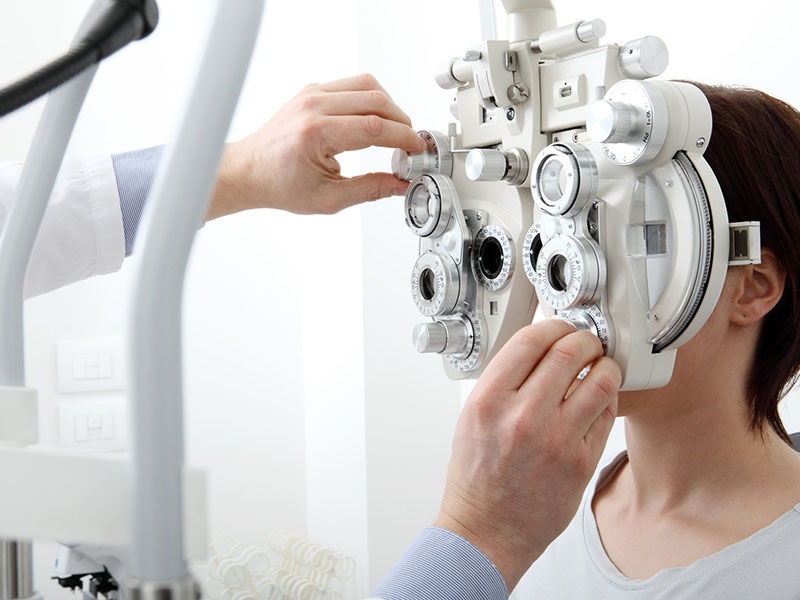
Ophthalmological Examination
Watch our video about Ophthalmological Examination
What is an Ophthalmological Examination?
An Ophthalmological Examination is a detailed assessment of the eyes and visual system conducted by a trained eye specialist. This comprehensive test evaluates eye health, vision clarity, and the overall functionality of the eyes, ensuring early detection of potential issues.
At Clinic Consultation, we offer advanced ophthalmological examinations tailored to each patient's needs. These assessments are essential for maintaining eye health and detecting conditions that could lead to vision loss if left untreated.
What is an Ophthalmological Examination Used For?
Ophthalmological examinations serve multiple purposes, including diagnosing eye conditions, monitoring chronic eye diseases, and assessing visual function. Regular eye exams are crucial for individuals of all ages, as they help identify problems early, when treatment is most effective.
These exams are also used for preventive care, ensuring the early detection of age-related changes, refractive errors, or complications from systemic diseases like diabetes or hypertension. At Clinic Consultation, our team provides personalised care to safeguard your vision and eye health.
How Does an Ophthalmological Examination Work?
An ophthalmological examination typically begins with a review of the patient’s medical history and current symptoms. Various tests are then performed to assess vision clarity, eye alignment, pupil response, and internal and external eye structures.
Advanced diagnostic tools, such as slit lamps or retinal cameras, may be used to capture detailed images of the eyes. Depending on the purpose of the exam, additional tests like tonometry (to measure eye pressure) or dilated eye exams may be performed. At Clinic Consultation, we ensure a thorough yet comfortable experience for all patients.
What Are the Types of Ophthalmological Examination?
Ophthalmological examinations can be customised based on specific needs and concerns:
Comprehensive Eye Exam
A complete evaluation of vision and eye health, including refraction tests, intraocular pressure measurement, and retinal examination. This is ideal for routine check-ups and diagnosing general eye conditions.Refraction Test
Determines the correct prescription for glasses or contact lenses by assessing how light bends as it passes through the eye.Dilated Eye Exam
Uses eye drops to widen the pupils, allowing a detailed view of the retina and optic nerve. It is particularly useful for detecting retinal diseases or complications from diabetes.Tonometry
Measures intraocular pressure to screen for glaucoma, a condition that can cause irreversible vision loss.Visual Field Test
Evaluates peripheral (side) vision, often used to diagnose glaucoma or neurological conditions.Slit Lamp Examination
Provides a magnified view of the front structures of the eye, such as the cornea, lens, and iris, to detect abnormalities.Retinal Imaging
Captures high-resolution images of the retina for detailed analysis, aiding in the detection of diseases like macular degeneration or diabetic retinopathy.
Each type of exam offers unique insights into eye health, and at Clinic Consultation, we utilise the latest technology to deliver precise and reliable results.
What Conditions Can Be Detected Through an Ophthalmological Examination?
Ophthalmological examinations are vital for detecting a variety of eye conditions, including:
Glaucoma
Measures intraocular pressure to detect damage to the optic nerve.Cataracts
Identifies clouding of the eye’s lens that affects vision clarity.Macular Degeneration
Detects age-related deterioration of the central retina.Diabetic Retinopathy
Evaluates retinal damage caused by diabetes.Refractive Errors
Diagnoses myopia (nearsightedness), hyperopia (farsightedness), and astigmatism.Dry Eye Syndrome
Assesses tear production and eye surface health.Retinal Detachment
Identifies signs of retinal separation that require urgent treatment.
When is an Ophthalmological Examination Indicated?
Eye exams are recommended in various situations, including:
Routine Vision Check-ups
For individuals of all ages to maintain optimal eye health.Blurred Vision or Eye Strain
To diagnose refractive errors or monitor digital eye strain.Chronic Conditions
For patients with diabetes or hypertension, which can affect eye health.Family History of Eye Diseases
To monitor for hereditary conditions like glaucoma or macular degeneration.Post-Surgery Monitoring
To evaluate healing and ensure the success of procedures like cataract removal.Frequent Headaches
To rule out vision-related causes of headaches.Redness, Pain, or Discharge
To diagnose infections or inflammatory conditions.
Pre- and Post-Ophthalmological Examination Care
Before the Test:
- Bring any current prescription glasses or contact lenses to the appointment.
- Inform your doctor of any symptoms, medical history, or medications you are taking.
After the Test:
- If dilation drops are used, avoid bright light and driving until the effects wear off.
- Follow any prescribed treatments or recommendations for follow-up exams.
What Are the Contraindications for Ophthalmological Examination?
Ophthalmological exams are generally safe, but certain factors may affect specific procedures:
- Allergic Reactions to Drops: Some patients may experience sensitivity to dilating or numbing eye drops.
- Severe Eye Infections: Acute infections may need to be treated before a full examination.
At Clinic Consultation, we ensure a safe and personalised approach for every patient.
What Are the Alternatives to Ophthalmological Examination?
For patients unable to undergo specific eye exams, alternative methods include:
- Non-Dilated Fundus Photography: Provides a detailed retinal image without dilation.
- Basic Vision Screenings: For quick assessments of visual acuity.
- Optical Coherence Tomography (OCT): Offers advanced imaging of retinal layers without invasive procedures.
Our specialists at Clinic Consultation work closely with patients to determine the most suitable diagnostic options.
Book Your Ophthalmological Examination at Clinic Consultation
Regular eye exams are essential for maintaining good vision and preventing serious conditions. At Clinic Consultation, we offer comprehensive ophthalmological examinations using cutting-edge technology and expert care. Schedule your eye exam online today and ensure the long-term health of your eyes.
Click here to schedule an appointment online